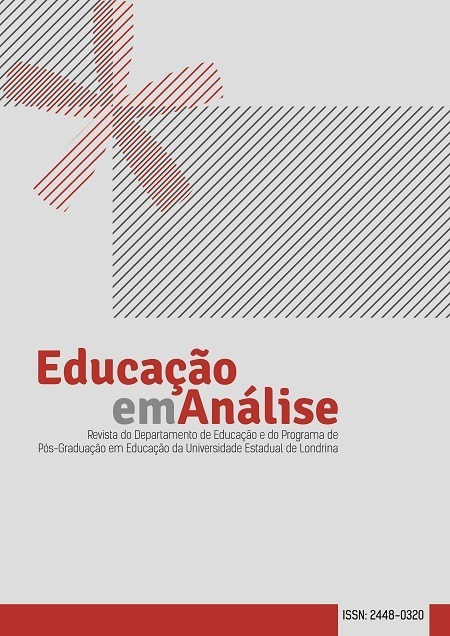Youth identities, school and life projects
DOI:
https://doi.org/10.5433/1984-7939.2023v8n1p213Keywords:
Identidade, Juventude, EscolaAbstract
The central concern of this essay is related to the different youth identities, to the youth condition of school access and to the school limitations and potentializers of the youths' life projects. Focuses on the statement that young people have a significant field of autonomy to build their own collections and cultural identities. It was constituted in a qualitative approach, produced through bibliographic research and documentary analysis, involving authors such as Carrano (2010), Carrano and Martins (2011), Alves and Dayrell (2015), Dayrell (1999) and Silva (2015) among others. As repercussions, considering that young people, depending on the group to which they belong and the way they want to be seen and recognized, show themselves in front of different youth cultural identities, building their own repertoires of knowledge and values. Young people demarcate territories of sociability and collective practices, which even happen inside schools. Schools are institutions of reference for young people, whether in the orientation process to make conscious choices about their personal life trajectories, or as, a space that enables the fulfillment of their dreams and the reduction of their conditions of vulnerability.
Downloads
References
ABROMAVAY, Miriam et al. Gangues, galeras, chegados e rappers: juventude, violência e cidadania nas cidades da periferia de Brasília. Rio de Janeiro: Garamond, 1999.
ALVES, Maria Zenaide; DAYRELL, Juarez. Ser alguém na vida: um estudo sobre jovens do meio rural e seus projetos de vida. Educação e Pesquisa, São Paulo, v. 41, n. 2, p. 375-390, 2015. Disponível em: https://www.scielo.br/j/ep/a/zdrYMY7tZzdtfw7sTkPRNTD/abstract/?lang=pt. Acesso em: 13 abr. 2023.
BRASIL. Ministério da Educação e do Desporto. Plano Decenal de Educação para Todos, 1993. Brasília: MEC, 1993. Disponível em: http://www.dominiopublico.gov.br/download/texto/me001523.pdf. Acesso em: 20 dez. 2020.
CARRANO, Paulo Cesar Rodrigues. O ensino médio na transição da juventude para a vida adulta: juventude e iniciação científica: políticas públicas para o ensino médio. Rio de Janeiro: EPSJV: UFPR, 2010.
COTRIM, Gilberto. Fundamentos da filosofia: história e grandes temas. São Paulo: Saraiva, 2002.
DAYRELL, Juarez. A escola "faz" as juventudes? Reflexões em torno da socialização juvenil. Educação e Sociedade, Campinas, v. 28, n. 100, 2007. Disponível em: http://www.scielo.br/scielo.php?script=sci_arttext&pid=S0101-73302007000300022&lng=en&nrm=iso. Acesso em: 20 dez. 2020.
DAYRELL, Juarez. Juventude, grupos de estilo e identidade. Educação em revista, Belo Horizonte, v. 30, n. 1, p. 25-39, 1999. Disponível em: http://educa.fcc.org.br/scielo.php?script=sci_abstract&pid=S0102-46981999000200004&lng=en&nrm=iso&tlng=pt. Acesso em: 13 abr. 2023.
DAYRELL, Juarez. O jovem como sujeito social. Revista Brasileira de Educação, São Paulo, n. 24, p. 40-52, 2003. Disponível em: https://www.scielo.br/pdf/rbedu/ n24/n24a04.pdf. Acesso em: 25 abr. 2020.
ENNE, Ana Lúcia. Juventude como espírito do tempo, faixa etária e estilo de vida: processos constitutivos de uma categoria-chave da modernidade. Revista Comunicação, mídia e consumo, São Paulo, v. 7 n. 20 p. 13-35 nov. 2010. Disponível em: https://revistacmc.espm.br/revistacmc/article/view/203. Acesso em: 13 abr. 2023.
GOHN, Maria da Glória. Educação não formal, aprendizagem e saberes em processos participativos. Investigar em Educação II ª Série, [s. l.], n. 1, 2014. Disponível em: https://epale.ec.europa.eu/sites/default/files/gohn_2014.pdf. Acesso em: 13 abr. 2023.
LARANJEIRA. Denise Helena Pereira; IRIART, Mirela Figueiredo Santos; RODRIGUES, Milena Santos. Problematizando as Transições Juvenis na Saída do Ensino Médio. Educação & Realidade, Porto Alegre, v. 41, n. 1, p. 117-133, 2016. Disponível em: https://seer.ufrgs.br/index.php/educacaoerealidade/article/view/56124. Acesso em: 12 abr. 2023.
LEÃO, Geraldo; DAYRELL, Juarez Tarcísio; REIS, Juliana Batista dos. Juventude, projetos de vida e ensino médio. Educação & Sociedade, Campinas, v. 32, n. 117, p. 1067-1084, 2011. Disponível em: https://www.scielo.br/j/es/a/Jr9sGWbKhNRCFwFBMzLg34v/?lang=pt. Acesso em: 10 abr. 2023.
MARANDINO, Martha. Faz sentido ainda propor a separação entre os termos educação formal, não formal e informal? Ciência e Educação., Bauru, v. 23, n. 4, p. 811-816, 2017. Disponível em: https://www.scielo.br/j/ciedu/a/cmjvH7v4mFZMsdjV5bWLJfM/?format=pdf&lang=pt. Acesso em: 10 abr. 2023.
MARTINS, Carlos Henrique dos Santos; CARRANO, Paulo Cesar Rodrigues. A escola diante das culturas juvenis: reconhecer para dialogar. Educação (UFSM), Santa Maria, v. 36, n. 1, p. 43-56, 2011. Disponível em: https://periodicos.ufsm.br/reveducacao/article/view/2910. Acesso em: 13 abr. 2023.
MORCELLINI, Mario. Passagio al futuro: formazione esociallizzazione tra vecchi e nuovi media. Milão: FrancoAngeli, 1997.
MOURA, Leila Silva de. Juventude e trabalho: o sentido do trabalho para o jovem aprendiz. RIOS, Paulo Afonso, v. 11, n. 14, 216-227, 2017. Disponível em: https://www.publicacoes.unirios.edu.br/index.php/revistarios/article/view/434. Acesso em: 13 abr. 2023.
PERALVA, Angelina. O jovem como modelo cultural. Revista Brasileira de Educação, Rio de Janeiro, n. 3, 1997. Disponível em: http://anped.tempsite.ws/novo_portal/rbe/rbedigital/RBDE05_6/RBDE05_6_04_ANGELINA_PERALVA.pdf. Acesso em: 10 abr. 2023.
SANTIAGO, Idalina Maria Freitas Lima; NASCIMENTO, Josilene Barbosa do; MOREIRA, Orlandil de Lima. Motivações e Autoavaliações da Participação Juvenil. In: SANTIAGO, Idalina Maria Freitas Lima; NASCIMENTO, Josilene Barbosa do; MOREIRA, Orlandil de Lima. Gênero, participação política e novas sociabilidades da juventude. São Paulo: Editora Filiada A. Abeu, 2016.
SCHUTZ, Alfred. Saggi sociologic. Torino: Utet,1979.
SILVA, Maciel Pereira da. Juventude(s) e a escola atual: tensões e conflitos no "encontro de culturas". Rev. Ed. Popular, Uberlândia, v. 14, n. 1, p. 46-59, 2015. Disponível em: https://seer.ufu.br/index.php/reveducpop/article/view/28958. Acesso em: 12 abr. 2023.
VELHO, Gilberto. Projeto e metamorfose: antropologia das sociedades complexas. Rio de Janeiro: Zahar, 1994.
ZALUAR, Alba. Gangues, galeras e quadrilhas: globalização, juventude e violência. In: VIANNA, Hermano (org.). Galeras cariocas, territórios de conflitos e encontros culturais. Rio de Janeiro: Editora da UFRJ, 1997.
Downloads
Published
How to Cite
Issue
Section
License
Copyright (c) 2023 Educação em Análise

This work is licensed under a Creative Commons Attribution-NonCommercial 4.0 International License.
Os artigos publicados na Revista Educação em Análise estão sob a Licença Creative Commons Atribuição 4.0 Internacional, garantindo Acesso Aberto. Deste modo, os autores mantêm os direitos autorais de seus trabalhos e, em caso de republicação, solicita-se que indiquem a primeira publicação nesta revista. Essa licença permite que qualquer pessoa leia, baixe, copie e compartilhe o conteúdo, desde que a devida citação seja feita. Além disso, autoriza a redistribuição, adaptação e criação de obras derivadas em qualquer formato ou meio, incluindo uso comercial, desde que a atribuição à revista seja mantida.
A revista se reserva o direito de efetuar, nos originais, alterações de ordem normativa, ortográfica e gramatical, com vistas a manter o padrão culto da língua e a credibilidade do veículo. Respeitará, no entanto, o estilo de escrever dos autores. Alterações, correções ou sugestões de ordem conceitual serão encaminhadas aos autores, quando necessário.
As opiniões emitidas pelos autores dos artigos são de sua exclusiva responsabilidade.
























